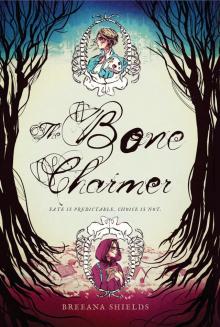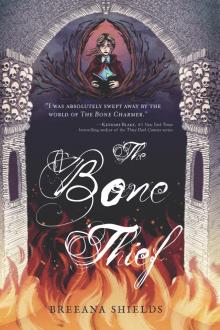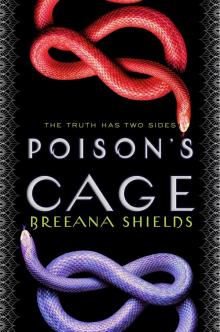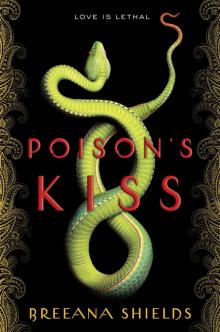- Home
- Breeana Shields
The Bone Charmer Page 13
The Bone Charmer Read online
Page 13
“Ah, well, it seems I forgot my weekly payment to the Watcher who keeps tabs on her with his espionage cat.”
This time it’s the corners of my mouth that lift just a little.
The Mixer looks back and forth between us as if he can’t make sense of the exchange. He’s not the only one.
Norah claps her hands sharply several times and the room falls silent. Bone races are a favorite among the apprentices, and there’s an air of anticipation in the room.
“Ready for the countdown?” Norah asks. She’s rewarded with several hundred fists pounding in unison on the tables. “Very well then. Three. Two. One. Race!”
I rip the cloth from the center of the table and toss it onto the floor. A pile of bones lies in a disorganized heap—our task is to work as a team to assemble them into a proper skeleton and identify the animal they came from.
Bram’s hand brushes mine as we both reach for the skull. His fingertips are soft. They twitch at my touch.
I pull away first. “Go ahead.”
Bram picks up the skull, turning it over in his hands as he studies it from every angle.
I start assembling the other bones—ribs, femur, tibia, fibula—threading them together and hanging them from the training frame. The Mixer boy bites his lip, staring at the vertebrae without touching them. He looks out of his depth. I reach around him and scoop the thin, delicate bones into my palm, counting them before I put them in their proper places.
“It’s a Bradypus,” I whisper.
“How do you know?” Bram doesn’t glance up from the bones he’s working with. His fingers are deft and they move quickly, sorting and assembling.
“Nine cervical vertebrae. High-crowned, open-rooted teeth. No incisors.”
Bram examines the ulna, radius, and digits. “I think you’re right.”
“What’s a Bradypus?” the Mixer boy asks.
“Three-toed sloth,” Bram and I say at the same time.
We slide the last few bones into place and leap to our feet. “Finished!” Bram shouts.
A chorus of disappointed groans fills the room, but no one stops working. We won’t be declared the winners until our work is inspected for accuracy.
Norah comes to our table and studies our skeleton. “Nicely done,” she says. “Have you identified the animal?”
“It’s a Bradypus,” I tell her.
Her eyebrows arch appreciatively. “Correct again. You make a good team.”
She says it to all three of us, but the Mixer boy barely touched the bones. It was me and Bram. She thinks the two of us make a good team. I think of the prison boat—of the last time we combined forces—and feel suddenly uneasy.
“We just got lucky,” I say.
Bram dims. His smile falters, then fades, and I’m struck with a sudden, swift loss.
A storm of confusion rages in my chest and I force myself to look at his hands splayed on the table. At his knuckles. Bram follows my gaze. His fists close and then disappear into his pockets.
“Bram—”
But he doesn’t let me finish. “I have somewhere I need to be.”
“Bram, wait—” I catch a bit of his cloak between my fingers, but he pulls away without looking back.
He’s gone before he gets to hear us pronounced the winners of the bone race.
Bram doesn’t show up in the dining hall for the evening meal.
I slide into my usual spot at the table between Tessa and Talon. Linnea sits across from me. Next to her, Bram’s seat is conspicuously empty. Though I try not to react to his absence, I must fail, because Tessa replies to my unasked question: “He has a headache.”
Linnea nods as she dips her spoon into her soup and brings it to her mouth, blowing delicately before she takes a bite. She swallows. “He’s resting in his room.”
“Poor guy looked like the bones had just predicted his untimely demise,” Talon says.
An uncomfortable feeling crackles inside me. Did Bram share his troubles with everyone except me? Did he tell them I offended him? The thought sits in my stomach like spoiled food.
I stir my soup absentmindedly, scoop up vegetables just to let them dribble off my spoon again. I’ve lost my appetite.
“So how is everyone’s training going?” Tessa asks.
“My ear-training drills must be paying off,” Talon says, “because I was finally able to identify the difference between the summoning tune for a spotted owl and the one for a gray wolf.”
“Those seem like they’d be really different melodies,” Linnea says playfully. “You must be a terrible singer.”
Talon lobs a piece of bread at her head. “They have the exact same tune, just in a different key. And for your information, my voice makes both men and women swoon.”
Linnea rests her chin in her palm. “Oh, now you’ve turned into a braggart? All right then, let’s hear it. Sing something for us.”
“I couldn’t,” Talon says. “Think about how it’d make the lesser apprentices feel. But if you don’t mind boasting, I have a particular Watcher in mind who could use a few bones snapped.”
She laughs. “If I wanted, I might actually be able to soon. The past few days, I’ve started breaking more by intention than by accident, which is a nice change of pace.”
“This must be a lucky week,” Tessa says. “I managed to completely close up a laceration in the clinic today. It’s the first time I’ve healed a problem without causing another one.” She turns to me and nudges my ribs with her elbow. “How about you, Saskia? Can you tell us what questions will be on our exams?”
I force a tight smile. “Only if Talon sings for us.” But I feel like a noose has tightened around my lungs. They’re all making such good progress and I’m failing at everything—bone reading, friendship, basic human interaction. Maybe I am foolish not to accept Master Latham’s help.
I stand and scoop up my tray. There’s no use sitting here and wasting time when I could be working with the practice bones.
“Not hungry?” Talon asks.
“Not really. And I have something I need to do.”
“Can’t it wait?” Linnea says. “You barely touched your food.”
My hands clench around the tray. It trembles in my fingers. Why does she think she can talk to me like I’m a child? Several seconds pass as I try to regain my grip on my temper. No good will come from snapping at Linnea. I channel my mother’s practiced calm, force my fingers to relax, my expression to go slack.
“I’m afraid not,” I say. “I should have eaten faster, but it’s too late now. I have an appointment with one of the Masters.”
Latham’s office is nearly as large as one of the practice rooms, though much more lavishly decorated. Thick red velvet drapes held back by golden cords hang on either side of the large picture windows, so long that they pool on the glossy white floors. White shelves filled with books, bones, and artifacts line the walls. Latham and I sit across from each other at a large table in the center of the room in plush, oversized chairs. A pile of practice bones lies on a black velvet cloth in front of me. Not finger bones this time, but human foot bones, the seven that make up the tarsus—calcaneus, talus, cuboid, navicular, and three cuneiforms.
Anticipation prickles over my skin.
“Has Kyra worked with you on bloodless readings?” Latham asks.
“No,” I tell him. Several of the entries in the spell book mention bloodless readings, but not in enough detail that I’ve been able to figure out how to do them.
“It’s an advanced skill,” he says, “one that takes a tremendous amount of time to master, but the practice bones should allow you to have some success.” He runs his hands across the bones, shifting them into a straight line.
“Bone Charming requires blood from the subject of the reading in order to bind the magic to the bones—otherwise, the past, present, or future is too vast to see at once. The magic must have direction and focus. The blood provides that—it serves as a kind of frame for what we wish to see. But very skilled Bone
Charmers can direct the magic with their thoughts.”
I think of all the times my mother has pricked the pads of my fingers and wonder why she didn’t just perform a bloodless reading. Or maybe occasionally she did and just never told me.
“How does it work?”
“Place your hands on the bones,” he says. “You need to be in contact with all of them.”
I put my palms on the line of bones, making sure I’m touching each of them.
“Good,” Latham says. “Now close your eyes and think of someone you know well. Someone you can imagine with perfect clarity.” He pauses. “Your mother, perhaps.”
My eyelids slide down, and I try to focus, but the first person who pops into my mind is Bram. I take a deep breath and try again. My mother flits into my mind—the fine lines that crinkle around her eyes when she smiles, the way she hums to herself when she’s in a good mood, the sprinkle of freckles that dusts the bridge of her nose in the summertime. I miss her more than I thought I would. It will be nice to see her again.
I allow my memories to sweep me away, feel the familiar tug of the bones just before a vision.
But it’s not my mother I see.
It’s Bram.
He lies in his room on his bed. His hands are tucked beneath his head and he stares at the ceiling. Startled, I yank my hands from the bones and open my eyes.
Latham studies me with his head tilted to one side. “You’re fighting it.”
“I just … I didn’t see what I was expecting.”
“You saw what you wanted to see.”
I flatten my palms against the table. “I’m distracted,” I tell him. I refuse to believe that I wanted to see Bram.
My father gave me a puzzle once—two interlocking rings made of steel that he claimed could be separated if I was clever enough. I spent weeks fiddling with it—examining it from every angle, twisting it in different directions, putting it down in frustration before picking it up again a few minutes later. I was obsessed with the rings, until I discovered the solution. Once I finally freed them from each other, I never picked them up again.
Bram is just another puzzle I can’t solve. The moment my mother said his name at the kenning, she turned him into an enigma. Since then, the prison boat has loomed large in my mind. The killer is the most terrifying person I’ve ever encountered, and I can’t stop picturing his face merging with Bram’s—both of them lit by flames, their hearts full of anger as they watched the world burn around them. The common thing I saw in each of their pasts is a sliver in my heart. Whenever I see the black triangles on Bram’s knuckles, I’m taken right back to that horror. Spending time with Bram hasn’t gotten me any closer to answers—he doesn’t seem like the person I’ve imagined over the last five years. But why would he have the exact same tattoos as the prisoner unless they had something essential in common?
Once I figure out Bram’s secrets, I won’t need to think about him anymore.
I cover the bones with my palms and try again. This time the bones tug me even more swiftly into a vision.
A knock at Bram’s door. He sits up and scrubs a hand over his face before he answers. Talon stands at the threshold, a paper bag in his hand. “Nothing cures a headache like stolen sweets.” Talon shakes the bag gently before offering it to Bram. “I risked my life to pilfer those from the kitchen, so I hope you appreciate them.”
Bram smiles wanly. “I promise to eat the evidence.”
“Good man,” Talon says. “Feeling any better?”
Bram pulls at the back of his neck. “Not really. I think I just need to sleep it off.”
“Well, then, I’ll leave you to your sweet rolls and your pillow.”
“It was good of you to come by,” Bram says. “And thanks for these.”
“Don’t mention it.” Talon ducks out of the room and closes the door behind him.
Bram sets the bag on his bedside table. He pulls his bedcovers back and strips off his shirt.
My breath catches. I open my eyes. Fold my hands in my lap.
“What did you see?” Latham asks.
“Nothing,” I tell him. “I couldn’t see anything at all.”
Saskia
The Tutor
Midwood is supposed to be safe. It’s why I longed to stay here, far from the dangers of bone magic. But ever since Rakel’s murder, my mind has been filled with vivid, horrible images—a slash across the throat, blood burbling at the wound, wide, dark eyes that slowly dim.
It makes it almost impossible to focus on tutoring Willem.
He’s supposed to be labeling the map of Kastelia I gave him—landmarks, cities, towns, distributaries that flow from the Shard River. Instead he’s drawing animals in the margins.
“Willem,” I say, “you need to focus or we’ll never finish.”
“Do you think they’ll come back?” he asks. He draws scales on a fish at the bottom of the map.
“Who?”
“The killers.”
An ache fills my chest. This is not something a child should have to worry about. It’s not something anyone should have to worry about. And yet the same questions have rustled in the heart of everyone in Midwood since the murder: Who did this? And why? Will they kill again?
“You know what?” I say. “I think we need to do something different today. How about a game?”
He perks up, pushes a tangle of curls out of his eyes. “What kind of game?”
“How about we go on a scavenger hunt for things that look like places on the map?”
He hops up from his chair. “That sounds fun!”
Audra’s house is perfect for an activity like this—it’s full of hidden passageways, nooks and crannies, and rooms filled with random treasures. Willem skips along as he points out landmarks—a bit of rope that is shaped like the slender town of Selvag, a miniature tree for holding jewelry that looks like the Shard with its many branches, a quilt with a pattern that reminds Willem of Midwood’s town square: brightly colored blocks that decrease in size as they get closer to the center.
This is as engaged in learning as I’ve ever seen him. It’s as if his feet need to feel like they are traveling far from the horrors of the last few weeks as much as his mind does.
The lesson turns from a game of learning to a game of hiding. On any other day I would try to pull Willem back, remind him that he needs to focus on the task at hand. But I don’t have the heart to do that. Not today. So I cover my eyes and count, listening as his footsteps grow distant and then disappear.
Searching for Willem in this house is like walking through a dreamscape. I open doors that lead to nowhere, walk through a passageway that has a window in the floor with a view straight down to a sitting area on the bottom level, and find a room decorated with hundreds of different-colored crystal baubles that dangle from the ceiling.
“Willem,” I call, “where are you?”
I open a closet door and find a row of ball gowns; all of them are floor-length and covered with various embellishments—sequins, feathers, pearls, flower petals. Not one of them looks as if it’s ever been worn. I wonder if Audra’s bone readings have nudged her toward clothing purchases, too.
This seems like the kind of place a little boy might choose to hide.
I push the dresses aside. But instead of a solid wall, I find a set of double doors, the kind that might normally grace the entry of a fine home. They appear to be made of walnut, and the top half is inset with frosted glass. I turn the handle.
“Willem? Are you in here?”
I push the door open the rest of the way and my breath catches. The room is filled with bones—hundreds of them, carefully labeled and displayed under glass. But these aren’t ordinary bones. These have already been prepared by a Handler—they’ve been bleached bright by sunlight, and they are painted to match the colorful tattoos of their owners.
It’s a bone museum.
I step up to one of the cases and lay my hand against the glass. Inside is a femur painted with three
purple slash marks, a skull with orange coils across the top, a clavicle with a row of flowers. Each bone is labeled with a name, a gender, an age at the time of death. None of these bones came from people in Midwood, and as far as I can tell, none of the people they belonged to are related to Audra.
So why does she have them?
Something in the corner of the room catches my eye. A case with the top off, as if the display is still in progress.
Inside is a bone with a tattoo I would know anywhere.
A drumbeat starts in my center and grows so loud, it’s all I can hear, all I can feel. It’s as if my heart is beating everywhere all at once—in my chest, my throat, my ears.
I go to the case and run my fingers along my father’s humerus, trace the jewel-tone waves that Oskar so carefully painted to match his mastery tattoo.
A sudden, sharp tug in my stomach makes the room tilt. I squeeze my eyes closed and my father’s face appears behind my lids. It feels exactly like falling into a premonition. My pulse spikes and I yank my hand away. This can’t be happening. My tendencies for magic should be disappearing by now. I didn’t have a binding ceremony, and I’ve never heard of an unmatched affinity lasting for this long beyond the kenning. I pull in slow, deliberate breaths and let my fear recede. When it does, I’m filled with an ache so strong, it brings tears to my eyes. This isn’t a prisoner whose memories will haunt me. This is my father—and I’d do anything to see him again.
Even bone magic.
I scoop up the humerus and cradle it in my arms. Then I close my eyes and allow myself to be swept away. My father’s face appears again, a paintbrush in his hand and a canvas in front of him. He smiles as a younger version of me enters the room.
“What do you think, bluebird?”
It’s a painting of my mother. She’s seated on a swing that hangs from a giant oak tree. Her bare toes point toward the sky and her head is thrown back in laughter, pale hair streaming behind her. I’ve never seen her look that carefree in real life.
“I love it,” I tell him.
His smile is radiant. “The two of you look so much alike, don’t you think?”

 The Bone Charmer
The Bone Charmer The Bone Thief
The Bone Thief Poison's Cage
Poison's Cage Poison's Kiss
Poison's Kiss